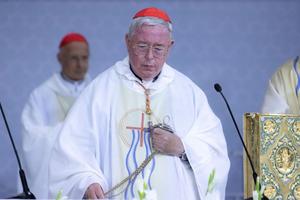Council of Cardinals: More Youth, Women Needed in Roman Curia
The cardinals gathered Sept. 11-13 to discuss the ongoing reform.

VATICAN CITY — One of the key talking points in the latest round of meetings for the Pope’s council of cardinals was the selection of personnel in the Roman Curia, with an emphasis on making it more international and with a higher number of young people and women.
The cardinals gathered for the 21st time in the Vatican’s Apostolic Palace Sept. 11-13 to discuss the ongoing reform of the Roman Curia.
Commonly referred to as the “C9,” the group was established by Pope Francis after his election as Bishop of Rome in 2013 to advise him in matters of Church governance and reform.
Absent from this week’s meetings were Cardinal Laurent Monsengwo Pasinya of Kinshasa and Cardinal George Pell, prefect of the Secretariat for the Economy.
In comments to journalists during a Sept. 13 press briefing, Vatican spokesman Greg Burke said that, as of now, no one is stepping in for Cardinal Pell during his leave of absence while facing charges for abuse in Australia.
Pope Francis himself was absent for the first day of meetings due to his recent trip to Colombia, but was present for the rest of the sessions apart from Wednesday morning, when he was at his weekly general audience.
In addition to reviewing the status of previous proposals given to the Pope regarding the reform of the Curia, members also took time for a special reflection on past speeches Francis has given on the topic.
Texts examined in the previous round of meetings, which took place in June, included proposals for the Dicasteries for Interreligious Dialogue, Eastern Churches, Legislative Texts, and the three courts of the Roman Curia: the Apostolic Penitentiary, the Apostolic Signatura, and the Roman Rota.
Led by Cardinal Oscar Rodriguez Maradiaga of Tegucigalpa, the reflection focused primarily on the speeches given by the Pope during his annual Christmas audiences with the Roman Curia, the consistories of February and October 2015, and his speech for the 50th anniversary of the Synod of Bishops in 2015.
In his comments to the press, Burke said specific themes discussed by the cardinals were the role of the Curia as “an instrument of evangelization and service for the Pope and the local Churches,” decentralization, the role of apostolic nunciatures, and the “selection and competence” of Curial personnel.
Specifically, Burke said four points were brought up in regards to Curia personnel: that the Curia be “less clerical, more international” and that there is “an increase in young people and women” among their ranks.
The role of young people, laity and women is something Pope Francis has emphasized strongly throughout his pontificate, as is the need for a more international Church that is less “Euro-centric.”
In fact, the laity, youth and women were key groups Francis brought up to the bishops of Latin America in his audience with them during his visit to Colombia, in which he said they are the faces of hope on the continent.
In his speech to the Curia Dec. 22, 2016, which is among the texts reflected on by the C9, Pope Francis said that when it comes to Curial officials, “in addition to priests and consecrated persons, the catholicity of the Church must be reflected in the hiring of personnel from throughout the world.”
This “catholicity” must also be reflected in the presence of “permanent deacons and lay faithful carefully selected on the basis of their unexceptionable spiritual and moral life and their professional competence,” he said.
In this view, “it is fitting to provide for the hiring of greater numbers of the lay faithful, especially in those dicasteries where they can be more competent than clerics or consecrated persons.”
He also stressed that “of great importance is an enhanced role for women and layeople in the life of the Church and their integration into roles of leadership in the dicasteries, with particular attention to multiculturalism.”
In addition to Curial personnel, the cardinals also discussed Pope Francis’ recent motu proprio, Magnum Principium, which gave more power to local bishops in the translation and approval of liturgical texts, and its implications for the Congregation of Divine Worship and the Discipline of the Sacraments.
Archbishop Rino Fisichella, president of the Pontifical Council for the Promotion of the New Evangelization, also addressed the group, speaking about updates in his dicastery.
And Cardinal Fernando Filoni, prefect of the Congregation for the Evangelization of Peoples, was to address the group on the latest work of the dicastery, which was a focus of June’s meetings.
The cardinals also re-read the statutes of the Dicastery for Laity, Family and Life, which was established in 2016 and is headed by Cardinal Kevin Farrell.
Cardinal Farrell also made an appearance at the C9 meetings and gave his fellow prelates an update on the dicastery’s work. Cardinal Sean O’Malley of Boston also briefed the group on the most recent work of the Pontifical Commission for the Protection of Minors, which he was tapped to lead in 2014.
Cardinal O’Malley was slated to meet with the Pope individually this afternoon. In response to journalists, Burke said the meeting would naturally involve the commission’s work, but would also touch on other topics.
The council’s next round of meetings is set to take place Dec. 11-13.
- Keywords:
- council of cardinals
- pope francis
- roman curia

















